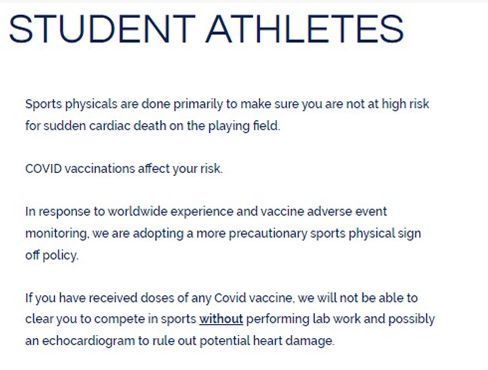
We recently became aware of a policy of a New Jersey family medical practitioner (in your region) that has the ability to create significant misinformation, confusion, and financial hardship.
New Jersey Statue C.18A:40-41.6 clearly communicates the role of student-athlete preparticipation physical examinations. The Hypertrophic Cardiomyopathy Association, HCMA, and other organizations in NJ worked to pass updates to this legislation to ensure all student-athletes are protected from all forms of cardiac complications up to and including sudden cardiac arrest (hypertrophic cardiomyopathy (HCM) it the most common cause of SCA in the young athletes). The assessment of cardiac arrest risk is a complex area covered in the required state-based training module for all practitioners performing both sports physicals and ‘well-child” exams. It is essential to ensure that school boards, school medical oversight providers, coaches, students, and parents are informed by evidence-based, scientifically proven theories and approaches to surveillance.
This practitioner has stated in a posted message in his office and on his website which was circulated through social media. After we saw this post we have learned posts with similar language have been circulating in many communities in the USA:
“Student-Athletes Sports physicals are done primarily to make sure you are not at high risk for sudden cardiac death on the playing field. Covid vaccinations affect your risk. In response to a worldwide experience and vaccine adverse event monitoring, we are adopting a more precautionary sports physical sign off policy:
If you have received one of any Covid vaccine, we will not be able to compete in sports without preforming lab work and possible echocardiogram to rule out potential heart damage.”

The American College of Cardiology, the American Heart Association, and other organization in the documents cited below have comprehensively refuted this false narrative . This policy and others like it may result in students being subjected to testing not covered by insurance as there is no medical necessity for the rationale behind this suggested testing. Additionally, it may result in vaccinated students being discriminated against and subject to disqualification from participation with no scientific or clinical reasoning.
The HCMA organized a podcast with Matthew Martinez, MD, FACC to address this matter.
Dr. Martinez, is the medical director of Sports Cardiology at Atlantic Health System and co-director of the Hypertrophic Cardiomyopathy Program. He also served as Chair of the Sports and Exercise cardiology section for the American College of Cardiology and routinely speaks nationally and internationally on the care of the athlete, hypertrophic cardiomyopathy, myocarditis, and COVID-19 related matters.
Please view the interview here:
On January 24, 2022 – American College of Cardiology published this article:
COVID-19 and the Athletic Heart: Key Updates from the American College of Cardiology Sports & Exercise Leadership Council by: Jonathan H. Kim, MD, MSc, FACC ; Aaron L. Baggish, MD, FACC ; Eugene H. Chung, MD, FACC ; Kimberly G Harmon, MD ; Matthew W. Martinez, MD, FACC ; Dermot M. J. Phelan, BAO, MB BCh, PhD, FACC ; Benjamin D. Levine, MD, FACC
Specific to young athletes, is the risk of vaccine-associated myocarditis higher than risks of COVID-19?
Myocarditis is a rare complication after the COVID-19 mRNA vaccination and has a much lower risk compared to the risks associated with COVID-19, regardless of age or sex. Young males aged 12-29 years have the highest myocarditis event rate by age grouping with 40.6 cases per million reported.9 In a separate analysis within the Military Health System between January-April 2021, out of 2.8 million doses of mRNA COVID vaccinations administered, only 23 men were diagnosed with clinical acute myocarditis (median age 25 [20-51] years).10 It is important to emphasize the extremely favorable benefit-to-risk ratio for COVID-19 vaccination in all age and sex groups.9,11 For SARS-CoV-2 infection, the mortality rate is 0.1-1 per 100,000 individuals aged 12-29 years. Although 39-47 estimated cases of myocarditis (primarily mild in severity) would be expected for every 1 million men aged 12–29 years after the second administered dose of mRNA vaccination,9 with vaccination, approximately 11,000 COVID-19 cases, 560 hospitalizations, 138 ICU admissions, and six deaths would be estimated to be prevented. Furthermore, beyond helping to reduce the risk of hospitalization and death, vaccination also helps to mitigate the risk of the long-term, debilitating effects of post-acute sequelae of SARS-CoV-2 infection, which is estimated to occur in 10-30% of individuals affected by COVID-19.12,13 Therefore, we continue to support vaccination in all athletes to minimize the risk of serious infection with COVID-19, as well as reduce individual viral load and spread of infection.
We encourage all governing bodies to ensure the science is followed. Please do not be confused efforts of some to inaccurately state the impact of COVID-19 vaccinations. If you would like to speak to Dr. Martinez he can be reached at 973-971-5899; additionally, you may email the HCMA at support@4hcm.org or call us 973-983-7429. If you would like to learn more about HCM please sign up for HCM Academy or visit 4hcm.org
Thank you for your time and attention.
Sincerely,
Lisa Salberg
Founder/CEO
Citations:
The post Student Athlete Screenings – COVID appeared first on Hypertrophic Cardiomyopathy Association.


 Translate
Translate

